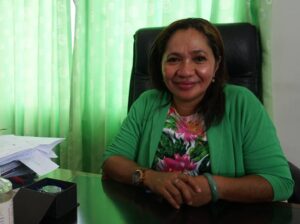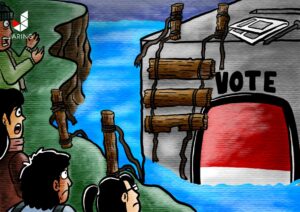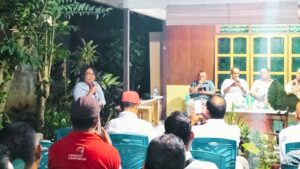The military remains in power in Thailand to this day. The dream of returning them to barracks and establishing civilian supremacy seems to fall short of expectations. However, violence and attacks on journalists declined drastically after the 2019 elections.
Pravit Rojanaphruk, a Thai journalist who was arrested by the army twice after the 2014 military coup, said that now there are no more arbitrary arrests and detentions of journalists like what happened to him in the past, just because of criticizing the regime. Today, journalists are free to criticize the regime in power without fear of being kidnapped or imprisoned.
However, there is still something that should not be criticized in Thailand: the power of the monarchy or kingdom. Because of this, the mass media in Thailand, especially the mainstream media, choose to do self-censorship—a practice that castrates press freedom.
Pravit was arrested in May 2014, after the military coup, for writing critical of the junta. He was later released and detained again in September 2015. He was taken to the military base blindfolded. Two days later he was released without charge, but military officials threatened to freeze his bank account if he continued to criticize the regime. As a condition of his release, he was forced to sign a form stating that he would no longer be involved in anti-junta activities.
Days after his release, the authorities of The Nation, where Pravit worked for 23 years, asked him to resign to avoid the newspaper facing government pressure. Pravit is now a columnist and senior writer for Khaosod English, and continues to write critically, particularly regarding the military regime’s crackdown on anti-royal sentiment. Under the Lese Majeste Act, criticism of the royal family carries a penalty of 3-15 years in prison.
On Monday, October 24, 2022, Jaring.id journalists, Fransisca Ria Susanti, Abdus Somad, and Reka Kajaksana interviewed Pravit via Zoom to discuss the latest political situation in Thailand, the condition of journalists, and press freedom. The following is an excerpt of the interview with the 2017 International Press Freedom Award winner from the Committee to Protect Journalists (CPJ).
What is the current political situation in Thailand, after the Constitutional Court’s decision that allows Prayut Chan-O-Cha to serve as prime minister until 2025 if he is re-elected?
The Move Forward Party, the second largest opposition party in Thailand, invites people to hold a referendum on election day. They demanded a new constitution, one of which stipulates that members of the Senate must not have originated from the former military junta. However, even if these demands are fulfilled, it will take a long time to draft the new constitution. So Prayut can still elect members of the senate, and the senate will elect him again as prime minister. It’s like a boxing match. On the one hand, I have to obey the rules, but on the other hand, the other side can get hit under the stomach.
However, The Move Forward Party can still be an option, especially among young people. They dared to shout for military reform, reform in many aspects, even the reform of the monarchy. They really want reform of the Lese Majeste Law. While the Pheu Thai Party, the first largest opposition party, is not quite clear on this.
Meanwhile, the Democrat Party several weeks ago issued a statement that they would not cooperate with the Move Forward Party because they often criticize the monarchy. The Bhum Jai Thai Party, a party popular for pushing the legalization of marijuana in Thailand, also said that it would not cooperate with the Move Forward Party after the election because of the party’s stance on the issue of the monarchy.
So, even though the Move Forward Party is currently very popular, it will still be difficult for them to form a government, even if they get a big victory to win a parliamentary seat later.
What are the issues brought up by political parties ahead of the election?
One of the issues of the election ahead is whether you oppose or support the legalization of marijuana. Among the coalition of government parties, not all agree with Bhumjaithai’s move. Many opposition parties are also opposed to the move. But Bhumjaithai is quite popular and gets a lot of support.
All cafes in Thailand are now free to sell marijuana. Many parents worry about the future of their children. But others think that it is good for the economy, attracting a lot of tourists.
What about press freedom?
The condition of press freedom after the 2019 election began to improve. The period of Prayut, who was not the leader of the junta, was more tolerant of criticism. There are no more arbitrary disappearances or arrests, as happened twice to me in the past. In this case, indeed there is improvement.
The problem that is still ongoing is that any discussion about reforming the monarchy is still taboo and the press is censoring it or the reporters or editors themselves are self-censoring. So that’s the problem. The press is now free to criticize any military, and even criticize Prayut, and there are no consequences. But monarchy remains taboo. Especially by the mainstream media. I am very disappointed with the media.
Several years ago, I asked the Thai Journalist Association (TJA), Thailand’s largest association of journalists, to sue or at least acknowledge that the Lese Majeste Act and media self-censorship or any exaggeration in the face of criticism of the monarchy are detrimental to press freedom in Thailand. .
So what was their response?
They remained silent. They pretended like it was nothing. Very embarrassing. I even wrote an article that I also put on Twitter, saying that I had contacted them. I said, if they can’t solve the problem, at least we have a duty to explain to the public how problematic this problem is. Even if they don’t want to do it, for example, board members are not comfortable talking about reforming the monarchy, at least they can organize a forum, invite academics and discuss the Lese Majeste Law, make a discussion forum on campus about this, then make the news. But they don’t want to do this either although it is easy to do.
I’ve read a book about North Korea. It tells about the encounter of former United States secretary of state Madeleine Albright with Kim Jong-il, and Jong-il expresses his admiration for the Thai monarchy. He said, “In the future, we have to learn how to relate to the people, like the Thai monarchy.”
This means that there is a subtle control mechanism (in Thailand), which is not even realized, so as to amaze a figure like Kim Jong-il. However, the best control is when we are able to internalize compliance, so that we no longer see it as a problem.
Therefore, I can’t imagine how the leaders of Thai journalists’ associations meet with journalists’ associations from other countries and talk about press freedom, but they don’t want to see and don’t want to say that their self-censorship is a problem.
Can you give an example of the self-censorship carried out by the Thai mass media?
I gave an example, out of 99 percent of the mainstream mass media in Thailand, none conveys the fact that the King of Thailand is more often in Germany than in his country. Though this was reported in detail by the German media.
If this does not affect the relationship between the two countries, no problem. It’s a private matter. But it affects. And no one (the media) discusses it.
Another example is how the media has faced demands for monarchical reform that have been submitted by protesters since 2020. A number of media have carried out self-censorship. Not all of the protesters’ demands were written down and banners condemning the monarchy did not appear in the media.
How do you see the possible self-censorship of the media or journalists in the run-up to the election?
Bangkok is the main city in Thailand. Everything is concentrated in Bangkok, including the mass media. These national media based in Bangkok depend on stringers, not full time reporters. They have other jobs, such as small business owners. But the problem is that they are vulnerable to bribery and candidates will send them a message when it comes to elections. Stringers can be biased because they are paid by the candidates.
What about independent media? What is the position of Khasoed English?
Khasoed English is part of the mainstream media. But regarding the monarchy, we can be independent. This is more because we are an English speaking medium. So what we write doesn’t directly affect the Thai language media because Prayut rarely reads English media.
Is there a case of a journalist who was ensnared by the Lese Majeste Law after the 2019 elections?
Very little, because they do self-censorship. They even carry out censorship that doesn’t really need to be censored, such as the fact that at times, the King of Thailand lives in Germany.
What about social media?
Over the past two years, hundreds of people have been ensnared by this law for criticizing the monarchy on social media. Last week, a librarian in her 20s was sentenced to 9 years in prison for posting this to three of her social media. She could be out on bail, and is currently filing an appeal.
What content does she post?
On criticism of the monarchy. You can’t talk negative about the King without taking you to jail. The king is like God. Last week, three people were convicted for the same and then they fled out of Thailand. Now we have a growing community of dissidents in Europe and North America.
The younger generation has different expectations. They dared to express their opinion about the monarchy and what kind of freedom they needed. And they then post it on social media. People no longer believe in the mainstream media. People choose to translate news from foreign media, especially related to criticism of the monarchy, then share it on Twitter, Facebook, and then they are arrested.
So digital attacks are mostly targeting social media activists and not journalists?
Yes, because most journalists choose to play it safe. They don’t want to deal with royal issues. I think they will be judged by history. I have conveyed this to them.
Apart from the Lese Majeste Law, does the Thai government also use the Computer Law to ensnare journalists or people who criticize the monarchy and post them on social media?
Yes, the Lese Majeste Law and the Computer Law. Five years in prison for one post. So if you criticize the kingdom and then post it on social media, then you will be considered to have committed two crimes.
Is there any advocacy from civil society groups?
Thai society basically keeps the kingdom untouched by criticism. Almost like religion. It is more free to criticize Gautama Buddha than to criticize the kingdom. We don’t have a consensus. That’s a Thai problem. We don’t have a social contract to agree on what kind of relationship citizens have with the monarchical institution and what are the boundaries. Another thing is about how important civil supremacy is. Those are two important issues for Thailand.
How would you compare the situation of journalists in Thailand with other countries in Southeast Asia?
I humbly say that we are in the middle among ASEAN member states. Of course it’s better than Cambodia, Laos, Vietnam, let alone Myanmar. Maybe it can be compared with Malaysia and Indonesia. Meanwhile in the Philippines, the press is free, but many journalists are being killed. I sympathize with the problems that every country faces. But at least the media or journalists understand and acknowledge the problem, not deny it.







